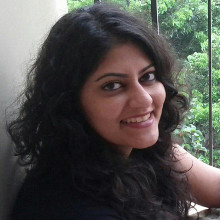[Photograph by Hemant Mishra of Mint]
Team Indus is India's only entry for the Google Lunar XPRIZE. It is competing against some of the best teams from eight other countries including the US, Japan, Germany, Spain, Italy and Israel. To win the prize, a team has to be the first to "land a robot on the surface of the Moon, travel 500 meters over the lunar surface, and send images and data back to the Earth". India's space agency Isro, which has sent satellites to the Moon and Mars, has never soft-landed before. Team Indus, founded in 2011, is aiming to do that. In January, it was one of four teams to win a $1 million Milestone Prize in the landing systems category, demonstrating that its hardware and software can soft land the spacecraft on the surface of the moon.
None of the founding members have a background in aerospace. They entered the fray with only a dream, enormous confidence and, having signed up a little late, very little time.
Sheelika Ravishankar is the Jedi Master in People Capital at Team Indus—a non-conventional title that reflects the unique status of the organization. In this podcast, she shares insights on how Team Indus has built a participatory culture that encourages failure as a stepping stone to achieving its mission.
Part 1: The science of finding the right attitude
Team Indus is able to attract a diverse set of people. For them to able to work well together, they need to have the right attitude, says Ravishankar. She says, the organization has a stringent recruitment process, where people are evaluated based on a behaviour-competency map. To develop that, the team first identified what they call the Indus Spirit—the critical behaviours people need to demonstrate in the team and outside to be able to create the culture they want.
The Indus Spirit is based on actual scenarios of the kind of behaviour that has had a positive or a negative impact. This behavioural framework is also used for reviews, feedback and strategy.
Part 2: A culture of peer reviews, constant feedback and no egos
Team Indus makes its multiple relationships with investors and employees work because their approach is participatory, not transactional. "It isn't 'you supply this, and I give you this in return'," says Ravishankar. Instead, Team Indus encourages them to be part of the journey by showing them the big picture—the moon mission—then breaking it down to small actionable items that they can participate in.
She also talks about how it is a learning organization. There is freedom to fail—you learn, apply, fail, try again.
What's worked best for them is building a culture of feedback. As soon as something happens, people give factual feedback—what happened, what worked, didn't work—based on facts. Interaction levels are very high, which enables a reality check if you are getting stuck or if egos come into play.
Part 3: Keep it simple, institutionalize the vision
If you want to build an organization and not just a product, building a culture is important. Your culture and our vision have to be totally aligned. And you maintain it as you grow by institutionalizing the culture with the current team—they are the ambassadors of the culture as the team grows.
People imbibe behaviour from role models, not from reading books etc, Says Ravishankar. It requires complete commitment from the role models—the leaders—who need to demonstrate the culture they want to build.
All a founder needs to do is figure out the values he wants to inculcate and then live those values. The earlier you start, the easier it is to institutionalize.
In a culture that encourages risk taking and being creative, how do you channelize the creativity towards productivity? That's where peer reviews help—by reiterating the mission. It’s Ok to fail, but you come back quickly enough if something doesn't work, rather than keep tinkering with it.
Also read the related article on Team Indus, by NS Ramnath
